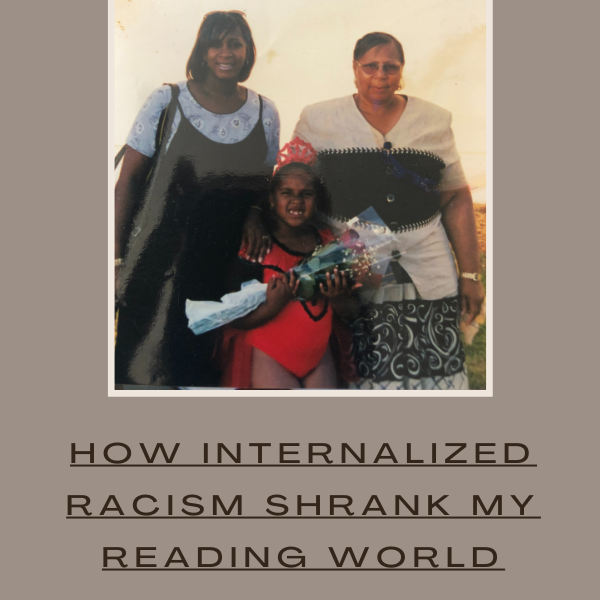Growing up, my mom was such a strong reading influence in my life. She was such an avid reader, even though she mostly listened to audiobooks, and at the time, I didn’t think those were real books because I was such a book snob. As an adult, most of my reading is done through audiobooks!
I remember taking trips to the library with my mom, impatiently waiting for her to finish browsing the audiobook section so I could go to the kids’ section to pick my books and play with the puzzles. To get me more involved and make a game for me, she would have me browse with her and look for all the audiobook covers that had a tree logo on them. This was the logo for the Griot Audiobooks, or basically all the Black books. She also listened to a lot of Alex Cross and Danielle Steel, but for the most part, it was Black books.
Those aren’t real books
When I got a bit older, she would play her audiobooks in the car with me (always making sure to turn it off if the cursing got a bit out of control or a sex scene came on), and I would roll my eyes at the covers. Always about thug passion or some preacher having affairs with all the other women in the church. I’m not sure when it happened, but I came to resent these books.
I felt like the “urban fiction” category was so reductive. I was pretentious enough to even think that these books aren’t real books. I hated them and I wanted to distance myself from being associated with them. Drug dealers and gang violence weren’t a part of my world, so why should I voluntarily include them?
Black on the outside, White on the inside
The books I read in middle in high school were about white, suburban, teen girls having white, suburban, teen girl problems. I went through some identity confusion stuff during that time. I went to predominantly White schools and most of my friends were White. Naturally, my peers influenced my likes and shaped the experiences I wanted to have. In order to fit in, I had to distance myself from Blackness. I was rewarded with “compliments” like “Your hair is so soft and not greasy”, and “You’re basically White” and “You’re like an Oreo”.
I think I was drawn to the books about white, suburban, teen girls having white, suburban, teen girl problems because I wanted to have that life. If I read the “urban” teen fiction (which I did a little), that would make me Black, and what would my White friends think of me then? Would some of everything I tried to reject rub off on me if I read the books my mom read? Those books weren’t for people like me, people who are only technically Black.
But the books about white, suburban, teen girls having white, suburban, teen girl problems weren’t for me either!
All Black Books Matter
The internalized racism was really rooted in me at that time, but I also found Black books I loved. I found Zora Neale Hurston and Toni Morrison and Alice Walker. I didn’t know there were books out there about different Black experiences. The more I found them, the more I found myself. I didn’t have to be confined to this one idea of Blackness I saw on TV and in the books my mom loved. I could be Black however I wanted.
However, it did take me a little longer to accept “urban fiction” as “real books”. While I saw my own expression of Blackness as legit, it took me a bit longer to accept that all forms of Blackness are legit. All Black books matter, regardless if they are Toni Morrison or Sister Souljah.


![This April we're diving into Muslim voices with some pretty incredible titles✨️
This members will also receive a sticker from @marhabaprints! Marhaba Prints is a South Asian and Islamic inspired online stationary store selling greeting cards, notepads, stickers, and more, that aims to be a bridge between Pakistani heritage, Islamic teachings, and Canadian culture.
As always we'll be discussing these titles in our online community! Join by April 9th to get one of these titles in your mailbox!
Learn more by heading to the link in our bio!
[alt text: three slides showcasing six books including: Hijab Butch Blue by Lamya H, All My Rage by Sabaa Tahir, Read Dangerously by Azar Nafisi, Read This to Get Smarter by Blair Imani, We Hunt the Flame by Hafsah Faizal, and You Exist Too Much by Zaina Arafat.]](https://www.feministbookclub.com/wp-content/plugins/instagram-feed/img/placeholder.png)